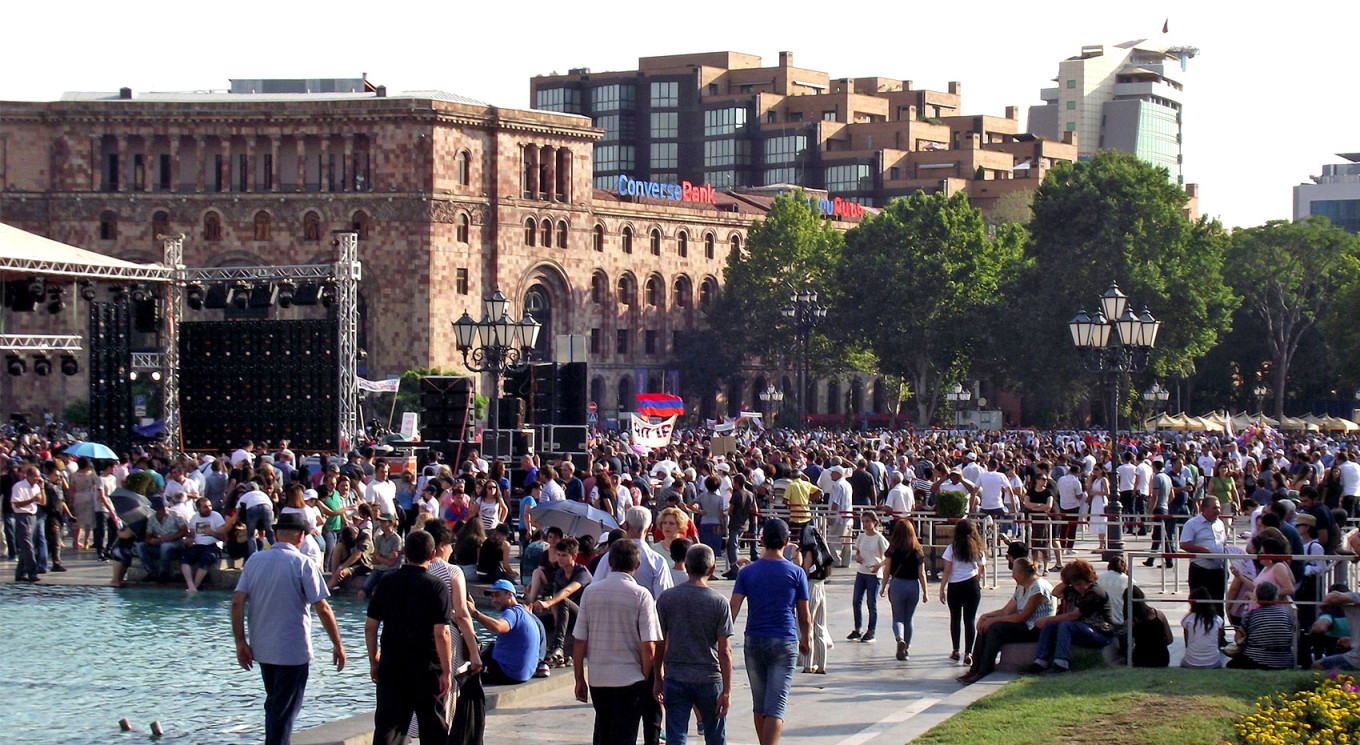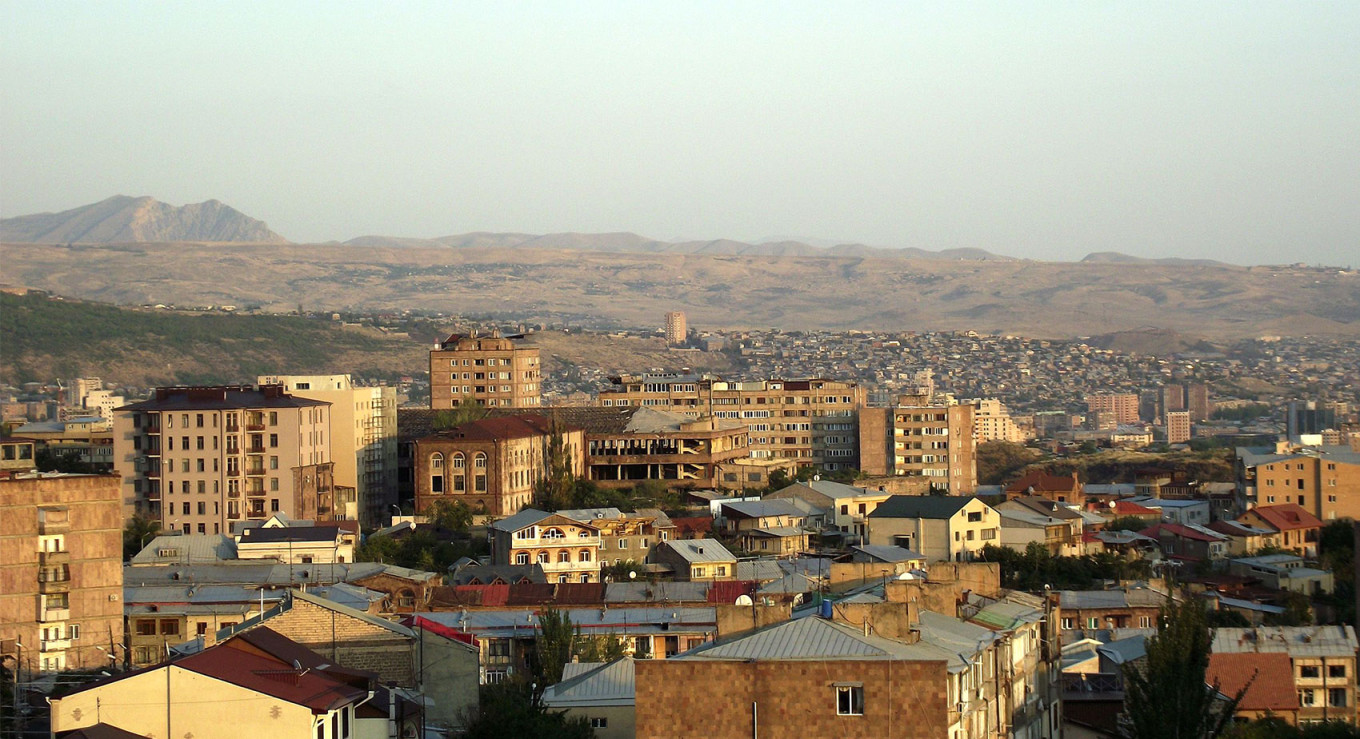YEREVAN, Armenia — Igor landed at Yerevan’s Zvartnots airport from Moscow on Tuesday, looking bewildered after his knee-jerk decision to flee his country’s mobilization.
“I am one of those who paid a very high price for a ticket, about $2,000,” said Igor, 30, who requested anonymity to speak freely.
“But then the tickets became even more expensive. My friend, for example, bought one for $5,000 and he will arrive tomorrow. After he gets here, we’ll think about what to do. We decided very quickly and just came.”
Igor is one of tens of thousands from all over Russia who have fled to this South Caucasus nation in recent days to avoid being mobilized and sent to fight in Ukraine.
This wave of Russians escaping the draft looks set to significantly impact Armenia, which, with a population of about 3 million, has already been deeply affected by an inflow of largely urban, middle-class Russians. The new arrivals have catalyzed soaring house prices and inflation at the same time as causing a mini-economic boom.
Volodya, 35, flew into Yerevan on the same plane as Igor. Although he was arriving for a long-planned holiday, he said he was unsure whether he would return to Russia.
“I am here with my wife and children just as a tourist. I planned to stay in Armenia for two weeks. I don't know what will happen after that,” he said.
“I don't want war; I don't want to fight. My only dream is peace, I don't want people to die in any country.”
While there are no exact numbers of Russians who have arrived in Armenia since Russian President Vladimir Putin announced the mobilization last week, more than 20 flights from Russia arrive in Yerevan every day — not only from Moscow and St. Petersburg, but also southern Russian cities like Sochi and Mineralnye Vody.

Over 30,000 Russians have crossed the border into neighboring Georgia and at least 98,000 into Central Asia’s Kazakhstan since Sept. 21, according to official figures.
And the current exodus looks set to dwarf the one that took place at the beginning of the war, when tens of thousands fled in fear of possible martial law, political repression, economic problems and international isolation.
A total of 372,086 Russians arrived in Armenia in the first six months of this year, according to official Armenian figures, up from 156,496 in the same period the year before.
While many of these people did not settle, often moving on to destinations in Europe or returning to Russia, those who did have transformed the country’s economy and society.
One of the most immediate consequences for ordinary Armenians has been rapidly rising real estate prices, particularly in Yerevan, triggering evictions and forcing out lower-income groups from the central areas most popular with incoming Russians.
Already in March, the year-on-year price to buy a square meter of real estate in downtown Yerevan had risen 20%. Rents have also skyrocketed since then.
While consumer price inflation exacerbated by the new arrivals is likely to subside after supply catches up with demand, housing inflation is a complicated issue, according to economist and businessman Samson Grigoryan.
“There is no quick solution,” he said. “Getting new housing stock is time-consuming.”

The northern city of Gyumri, another common destination for Russians, has also been hit by the rising prices.
“I am a programmer. Half a year ago our entire company moved to Yerevan, Armenia. Initially, our employer rented an apartment for us, but it has been a month since that clause of the contract expired and we have had to take care of our own needs. That’s why I moved to Gyumri,” said Natalya, 25, from the central Russian city of Perm.
“This is a very colorful city and… life here is relatively affordable,” she added.
Inflation in Gyumri’s real estate sector was a problem earlier in the year but has largely been brought under control, according to Lisa Gasparyan, a Gyumri tourism specialist.
“The city has guests from Russia, Belarus and Ukraine. We are peace loving. We will welcome everyone, just let there be peace,” she told The Moscow Times.
At the same time, the arrival of tens of thousands of Russians, often with significantly higher disposable incomes than locals, has contributed to something of an economic boom across Armenia.
The European Bank of Reconstruction and Development (EBRD) last week revised upward its economic growth forecast for Armenia this year from 4.5% to 8%, noting that GDP expanded 13.1% in the first six months of 2022.
“Negative spillovers from the country’s high exposure, through trade, remittances, and foreign direct investment, to the sanctions-hit Russian economy were outweighed by the arrival of many people and businesses from Russia,” the EBRD said in its Regional Economic Prospects report.
Igor, who fled mobilization and arrived in Yerevan having paid $2,000 for a ticket, did not yet know where in Armenia he would settle. But, as a trained engineer, he said his friends had told him he would be able to quickly find work.
Russian emigres to Armenia have set up new bars, cafes, schools and media outlets. While these are concentrated in Yerevan and Gyumri, there are also Russian communities in the mountainous resort town of Dilijan and Armenia’s third-largest city, Vanadzor.
“Any human influx also contributes to the development of regions,” said Grigoryan.
“As Yerevan is not made of rubber, it cannot accommodate everyone.”
A Message from The Moscow Times:
Dear readers,
We are facing unprecedented challenges. Russia's Prosecutor General's Office has designated The Moscow Times as an "undesirable" organization, criminalizing our work and putting our staff at risk of prosecution. This follows our earlier unjust labeling as a "foreign agent."
These actions are direct attempts to silence independent journalism in Russia. The authorities claim our work "discredits the decisions of the Russian leadership." We see things differently: we strive to provide accurate, unbiased reporting on Russia.
We, the journalists of The Moscow Times, refuse to be silenced. But to continue our work, we need your help.
Your support, no matter how small, makes a world of difference. If you can, please support us monthly starting from just $2. It's quick to set up, and every contribution makes a significant impact.
By supporting The Moscow Times, you're defending open, independent journalism in the face of repression. Thank you for standing with us.
Remind me later.







